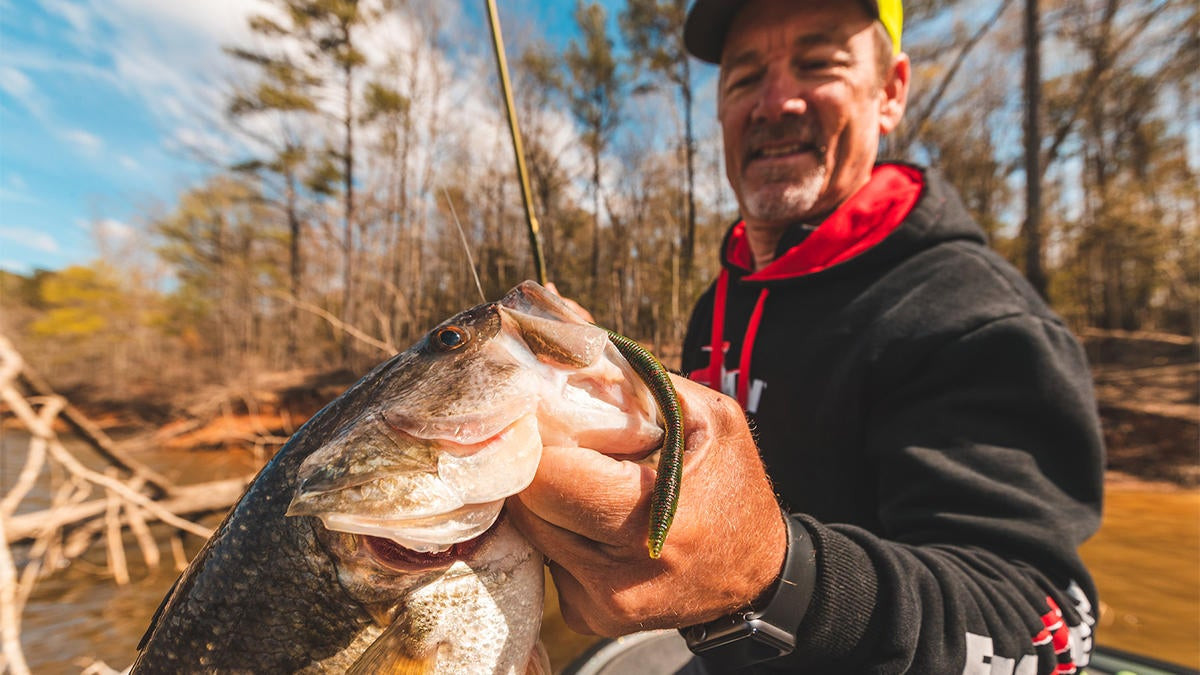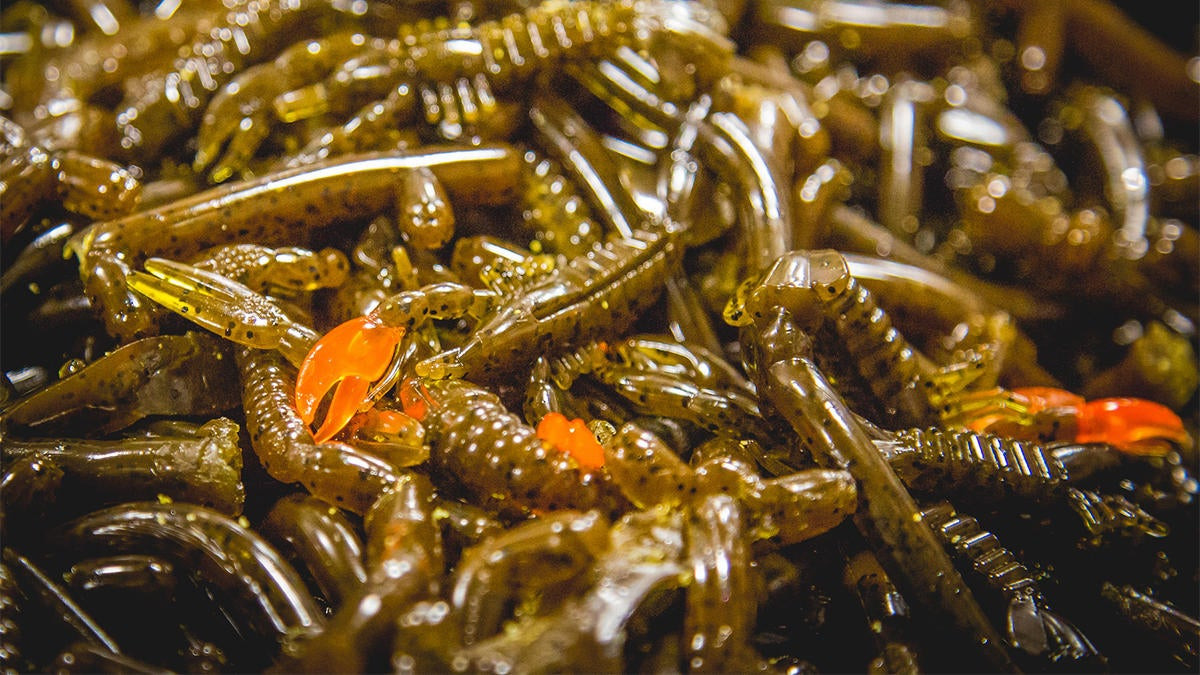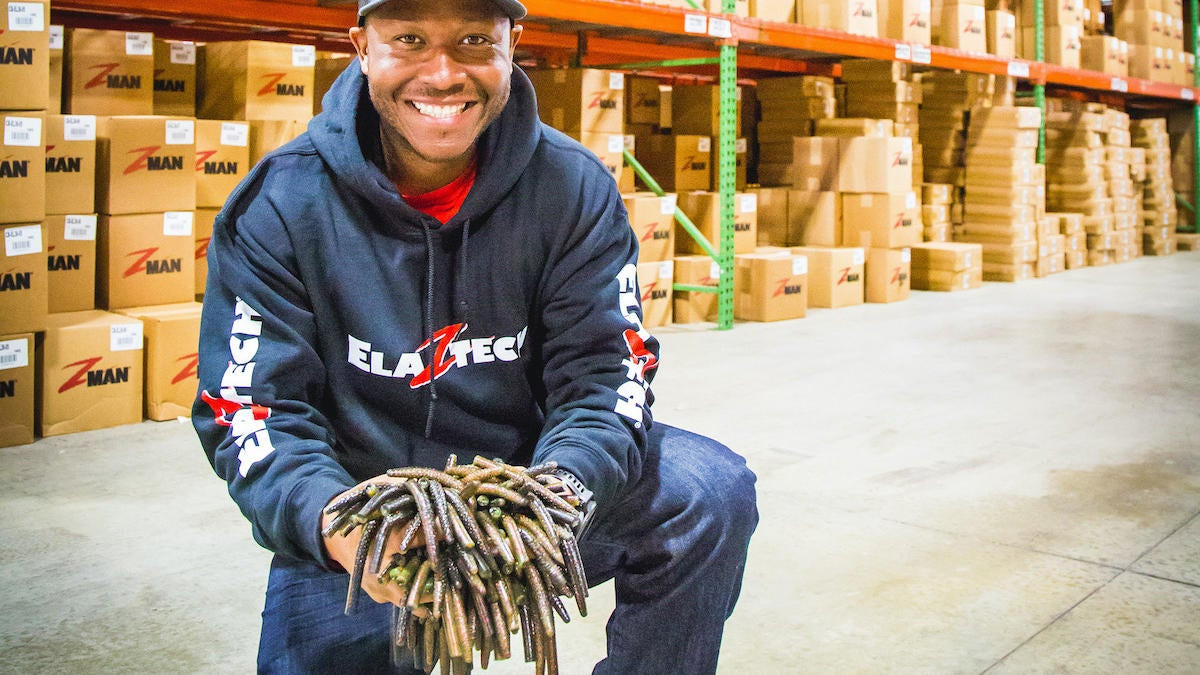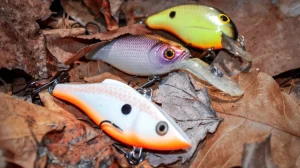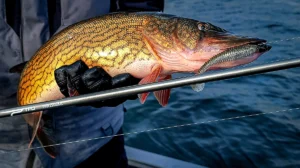Seventy years have now passed since Nick Creme created the first plastic worm from vinyl plastic, oils and pigments. Creme’s ingenuity set in motion a burgeoning soft bait industry. And yet, it’s interesting to consider that most of today’s bait manufacturers still use the same old polyvinylchloride (PVC) based soft plastics, decades later. By contrast, materials and technology to develop new fishing lines, rods, reels and electronics have improved and increased fishing success with each passing season.
Meanwhile, inside the laboratory of an certain South Carolina fishing tackle company, creative minds were churning in a different direction, working toward a radical softbait recipe with intriguing possibilities. The day the calendar flipped to 05/05/05— following several starts, stops and reboots— the first batch of the newly perfected baits virtually crawled out of their aluminum molds.
Following three years of research and development, the folks at Z-Man Fishing—at the time the world’s largest provider of silicone lure skirts—had achieved what others refused to consider possible. “From early on, we were really motivated by the idea of creating a bait from an environmentally benign substance that outperformed traditional PVC baits in the water,” recalls Jolee Myers, Operations Manager at Z-Man Fishing.
“Among a host of existing products and materials on the table, we identified some creepy-crawly kids toys whose composition seemed to check the right boxes. Among several advantages, we especially liked the fact the material floated without having to add plastic beads or so-called microballoons. That was a huge discovery because it meant we could create a much more realistic bait, with tails, claws and appendages that would float up in a natural, lifelike posture.”
Although the foundational material was already in use in certain consumer products, Myers and others at Z-Man quickly realized that the commercially available compounds weren’t quite right for fishing baits.
“We were in uncharted waters; there was no playbook for creating baits from a state-of-the-art material we eventually named ElaZtech,” says Myers, a sixteen-year Z-Man executive who helps oversee the day-to-day bait-making facility near Charleston, South Carolina. “We worked for three years to finally develop a workable material and the right machines and processing with which to make baits.
“The great part about working with such a unique, unusual material, though, is that it allowed us—and still does— to keep an open mind and constantly innovate new formulas and ways to improve on the fishability of the baits. By maintaining our USA based operations, we can also control and perfect every aspect of bait making, from changing the baits’ durometer (softness) and buoyancy to adding scent or fine-tuning colors to the exact specifications required by anglers.”
PVC, phthalates and the environment
Following the model of their successful OEM lure-skirt business, the Z-Man brand initially stayed behind the scenes, manufacturing its earliest ElaZtech baits for Strike King Lure Company, including the Strike King Zero stickbait that keyed VanDam’s Bassmaster win. Beginning in 2008, Z-Man began packaging ElaZtech baits with its own logo and promoting under the Z-Man brand in earnest. Baits such as the TroutTrick and DieZel MinnowZ became worldwide best sellers on the saltwater scene. Z-Man also revolutionized the finesse and Ned rig bass arena with baits like the Finesse TRD, ZinkerZ and Finesse ShadZ.
In effect, ‘050505’ marked a new era for softbaits-a wholly original category of lively, super durable and environmentally safe fishing lures. “ElaZtech is a very different material from PVC plastisol,” notes Myers. “While PVC baits use a plasticized form of PVC resin with softening agents containing toxic chemicals known as phthalates, ElaZtech uses non-toxic, non-reactive resins. About eighteen years ago, PVC plastisols used in baby bottles, toys and other products were pulled from the market because the FDA realized the products’ phthalates were leaching out and making people sick.
“In part because it looked like PVC might be on its way out, particularly in single-use and food packaging applications, we sought alternative bait materials from day one,” notes Myers, “In essence, ElaZtech is a thermoplastic elastomer (TPE), made from a non-toxic, food-grade and pharmaceutical-grade resin. Familiar product applications include cosmetics, baby bottles and medical and healthcare products.”
Myers admits that while ElaZtech offers manifold environmental and angling advantages, producing baits from the material is expensive because it requires longer cycle times and specialized machinery. “Thankfully, we’re able to avoid passing those costs to consumers because we control the entire manufacturing process locally,” notes Myers. “Raw materials to produce ElaZtech baits all come from the USA, which also enables us to ship products in and out the door with the same local carriers, affording us substantial savings.”
TPE tricks
Equally important, says Myers, ElaZtech baits offer anglers several exciting benefits over PVC-based baits. “Anglers tell us ElaZtech is the perfect bait material because it’s incredibly soft and natural to the touch yet unbelievably durable at the same time. An ElaZtech bait will stretch up to twelve times its length without ripping. In many cases, anglers have caught well over a hundred bass on a single Z-Man bait. (The record currently stands at 246 fish caught on a single Z-Man Finesse WormZ.) It’s really wonderful stuff, like, we sometimes wonder if it came here from another planet,” Myers laughs.
Myers also notes, “When ElaZtech finishes the cooling and hardening cycle, it’s as clear as glass, and gives us the flexibility to do anything we want to it from a coloring perspective. This has enabled us to give anglers some really unique color patterns.”
Another element breathing life into ElaZtech: Natural buoyancy gives baits the ability to move with unheard-of underwater action. “When Ned Kehde put some early ElaZtech bait prototypes in my hands, I immediately realized this material would be revolutionary,” said Drew Reese, an exceptional angler and bait designer who finished 7th at the very first Bassmaster Classic.
“ElaZtech baits exhibit the underwater angle all lure companies have been trying to achieve since the early 1900s: to make a bait that doesn’t lie flat on bottom, but that rises up on its own and moves like something truly alive.”
To provide taste, texture and weight for casting, Z-Man also preloads ElaZtech select baits like the Finesse TRD with salt. Others, like the ZinkerZ are infused with so much salt that the material’s buoyancy is completely altered, and the baits exhibit a slow-sink action. “What’s interesting is that as salt dissolves in water, the bait gets sticky, almost slimy, which seems to be tremendously appealing to biting fish,” notes Myers. “Anglers can also stretch the baits to remove salt and restore buoyancy. The salt leaves behind tiny spongelike pockets that are perfect for absorbing and holding oil based scents like Pro-Cure Super Gel for a good long time. And if you want to create a bait combo that never, ever comes off the jig, add a dab of Loctite® Gel Control®. This stuff bonds with the ElaZtech and locks it onto the jig collar, more or less for the rest of your life.”
While ElaZtech offers undeniable angling rewards, Myers points out one caveat regarding bait storage. “Because the plasticizer in ElaZtech reacts with conventional PVC baits, you’ll want to avoid storing them in the same container. Best thing you can do is to simply store your ElaZtech baits in their original packages, and keep them off the hot dashboard in your truck. Other than that, ElaZtech is pretty much a miracle material,” concedes Myers.
“Doesn’t matter if you’re fishing a drop shot, Carolina or a Ned rig,” says Reese. “ElaZtech baits excel in every situation because they self-activate and move by themselves. Compare that to a PVC bait that falls over and lies lifeless on the bottom, and you quickly understand the allure of ElaZtech.”


